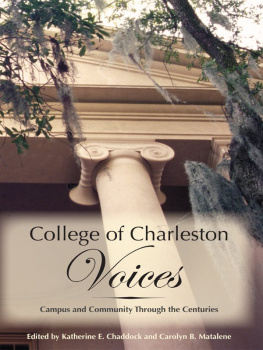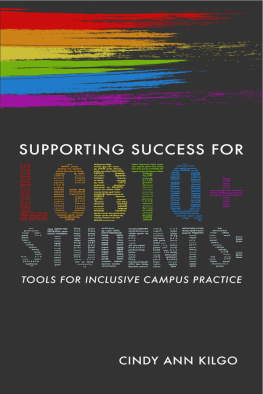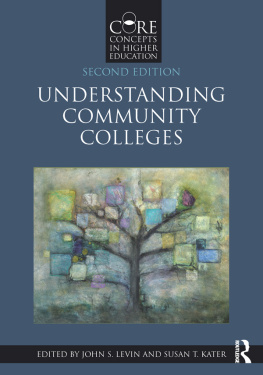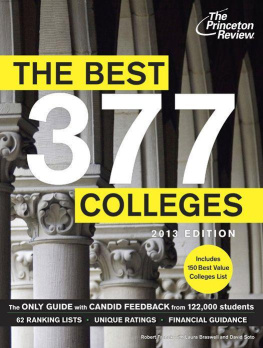
APPLYING THE COLLEGE COMPLETION AGENDA TO PRACTICE
Katherine L. Hughes, Andrea Venezia (eds.)
New Directions for Community Colleges, no. 167
Arthur M. Cohen, Editor-in-Chief
Caroline Q. Durdella, Nathan R. Durdella, Associate Editors
Copyright 2014 Wiley Periodicals, Inc., A Wiley Company. All rights reserved. No part of this publication may be reproduced, stored in a retrieval system, or transmitted in any form or by any means, electronic, mechanical, photocopying, recording, scanning, or otherwise, except as permitted under Section 107 or 108 of the 1976 United States Copyright Act, without either the prior written permission of the Publisher or authorization through payment of the appropriate per-copy fee to the Copyright Clearance Center, 222 Rosewood Drive, Danvers, MA 01923; (978) 750-8400; fax (978) 646-8600. Requests to the Publisher for permission should be addressed to the Permissions Department, c/o John Wiley & Sons, Inc., 111 River St., Hoboken, NJ 07030; (201) 748-8789, fax (201) 748-6326, www.wiley.com/go/permissions.
NEW DIRECTIONS FOR COMMUNITY COLLEGES (ISSN 0194-3081, electronic ISSN 1536-0733) is part of The Jossey-Bass Higher and Adult Education Series and is published quarterly by Wiley Subscription Services, Inc., A Wiley Company, at Jossey-Bass, One Montgomery St., Ste. 1200, San Francisco, CA 94104. POSTMASTER: Send address changes to New Directions for Community Colleges, Jossey-Bass, One Montgomery St., Ste. 1200, San Francisco, CA 94104.
SUBSCRIPTIONS cost $89 for individuals in the U.S., Canada, and Mexico, and $113 in the rest of the world for print only; $89 in all regions for electronic only; $98 in the U.S., Canada, and Mexico for combined print and electronic; $122 for combined print and electronic in the rest of the world. Institutional print only subscriptions are $311 in the U.S., $351 in Canada and Mexico, and $385 in the rest of the world; electronic only subscriptions are $311 in all regions; combined print and electronic subscriptions are $357 in the U.S., $397 in Canada and Mexico, and $431 in the rest of the world.
EDITORIAL CORRESPONDENCE should be sent to the Editor-in-Chief, Arthur M. Cohen, at 1749 Mandeville Lane, Los Angeles, CA 90049. All manuscripts receive anonymous reviews by external referees.
New Directions for Community Colleges is indexed in CIJE: Current Index to Journals in Education (ERIC), Contents Pages in Education (T&F), Current Abstracts (EBSCO), Ed/Net (Simpson Communications), Education Index/Abstracts (H. W. Wilson), Educational Research Abstracts Online (T&F), ERIC Database (Education Resources Information Center), and Resources in Education (ERIC).
Microfilm copies of issues and articles are available in 16mm and 35mm, as well as microfiche in 105mm, through University Microfilms Inc., 300 North Zeeb Road, Ann Arbor, MI 48106-1346.
Editors' Notes
Significant pressure is on community collegesand all higher education institutionsto increase student completion rates. As the ability to track students progress through college has improved, the inability to effectively support manyand in some cases moststudents through to graduation has become of national concern. Multistate initiatives such as Achieving the Dream, Completion by Design, the Developmental Education Initiative, and Complete College America, along with math reform efforts such as Statway, Quantway, and the New Mathways, have emerged and built upon one another in driving change grounded in evidence. Pressure from the Obama administration, philanthropic foundations, industry representatives, state policymakers, and others has spurred a sharp focus on the kinds of supports, incentives, and programmatic changes necessary to help a larger proportion of students succeed. This all comes after years of budget-cutting at the federal, state, and local levels, along with ongoing demographic changes that, when combined, are forcing postsecondary education systems and institutions to do more with less for an often increasingly underprepared entering student body.
The Winter 2013 volume of New Directions for Community Colleges, titled The College Completion Agenda: Practical Approaches for Reaching the Big Goal (Phillips & Horowitz, 2013), presented informative articles addressing reforms of different aspects of community colleges, such as the role of leadership in transforming institutional culture, using data to drive change, re-designing academic pathways to better encourage student persistence and completion, and the importance of financial aid, among other topics. These, together, illustrate that the field has made significant progress in developing the knowledge and strategies needed to increase credential completion.
This volume builds on that work in providing a set of chapters that elucidate the change processes underway in institutions and classrooms. The following chapters, mostly authored or coauthored by practitioners, describe the catalysts, the efforts, the false starts and mistakes, and the successes achieved. The aim is to add to the growing body of literature on evidence-based change in a way that helps practitioners understand clearly how these innovations were developed, implemented, and scaled, so as to apply lessons regarding replication in different contexts and under different conditions. Overburdened and resource-strapped community college educators need not reinvent reform strategies but can learn from those already initiated and in place.
As developmental education has been receiving intensive scrutiny as of late, the volume includes three chapters describing new approaches that are showing improved student outcomes. Susan Bickerstaff, Maria Scott Cormier, and Di Xu, from the Community College Research Center, and Barbara Lontz, from Montgomery County Community College in Pennsylvania, present a case study of an arithmetic and prealgebra course redesign, Concepts of Numbers, that adopts a new instructional approach. Next, Peter Adams and Donna McKusick, of the Community College of Baltimore County, reflect on the development and growth of the Accelerated Learning Program (ALP), the college's developmental writing program. Both chapters emphasize how course instructors needed significant support in teaching differently. And both courses are now being replicated in other institutions.
Furthering the theme of scaling and spread of reform, the third chapter addressing developmental education, by Katie Hern with Myra Snell, tells a compelling tale of data-driven change through a community of practice across multiple colleges in California. These authors express clearly the many forces working against changeentrenched beliefs about students capabilities, lack of curricula and textbooks for reimagined courses, inflexible transfer articulation policies, and lack of policy support generallythat perseverance and presentation of evidence are breaking down, little by little.
The next two chapters focus on new approaches to supporting students as they adjust to college, select courses and majors, and strive in the classroom. Mina Dadgar, Thad Nodine, Kathy Reeves Bracco, and Andrea Venezia argue for a better integration of institutions instruction and support services aspects and provide concrete examples from the field. They and others have pointed out the fact that community college students generally need far more support than the colleges resources allow, so building guidance and assistance into courses can be efficient as well as more effective than the status quo. Gary Rodwell outlines how an online navigation system can empower students to understand where they are in the progression continuum at their colleges and what lies ahead if they are to graduate. This, then, enables them to plan and make rational choices connected to their education goals.
Next page







